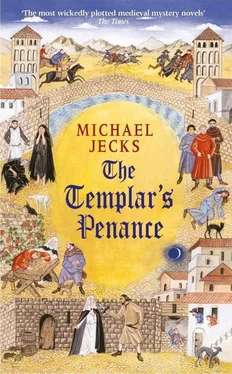Michael Jecks - The Templar
Здесь есть возможность читать онлайн «Michael Jecks - The Templar» весь текст электронной книги совершенно бесплатно (целиком полную версию без сокращений). В некоторых случаях можно слушать аудио, скачать через торрент в формате fb2 и присутствует краткое содержание. Год выпуска: 2014, ISBN: 2014, Издательство: Headline, Жанр: Исторический детектив, на английском языке. Описание произведения, (предисловие) а так же отзывы посетителей доступны на портале библиотеки ЛибКат.
- Название:The Templar
- Автор:
- Издательство:Headline
- Жанр:
- Год:2014
- ISBN:9781472219763
- Рейтинг книги:4 / 5. Голосов: 1
-
Избранное:Добавить в избранное
- Отзывы:
-
Ваша оценка:
- 80
- 1
- 2
- 3
- 4
- 5
The Templar: краткое содержание, описание и аннотация
Предлагаем к чтению аннотацию, описание, краткое содержание или предисловие (зависит от того, что написал сам автор книги «The Templar»). Если вы не нашли необходимую информацию о книге — напишите в комментариях, мы постараемся отыскать её.
The Templar — читать онлайн бесплатно полную книгу (весь текст) целиком
Ниже представлен текст книги, разбитый по страницам. Система сохранения места последней прочитанной страницы, позволяет с удобством читать онлайн бесплатно книгу «The Templar», без необходимости каждый раз заново искать на чём Вы остановились. Поставьте закладку, и сможете в любой момент перейти на страницу, на которой закончили чтение.
Интервал:
Закладка:
When Simon had set off after the felon, Baldwin had been helping to disarm one of Domingo’s men, and had not noticed his friend’s sudden disappearance. Later, when he and Munio wondered why Simon had not come to help interrogate the members of the band, Baldwin was only just in time to hear of the accident, and then he had bolted after the messenger to go and supervise Simon’s rescue.
It had been one of the most repulsive tasks Baldwin had ever witnessed. The two men had fallen through the floor of the garderobe, toppling together some fifteen feet into the relative softness of the heaped sewage underneath. It was fortunate that the toilet did not fall straight into a stream, as so many did, for then Simon must surely have drowned. As it was, he fell backwards into the muck, Domingo on top of him, embedding Simon’s sword deep within his torso. The robber was already dead when Baldwin arrived; the knight had thought Simon was as well.
It was a terrible shock. Baldwin had known many comrades die, and he would have said, had he been asked, that he was all but inured to loss. True, he would not have felt that way about his wife, nor his daughter, but he would have thought that losing the companionship of a man was something he had been long seasoned against fearing. The idea that a man’s death could bring him up so sharply had not occurred to him. Yet here it was. His hand grasped his sword hilt as though to keep his grip on reality, but all he could see was the terrible future, of returning to England without his best friend, of telling Simon’s wife and family that he was dead. He could imagine all too easily the appalled horror in Meg’s eyes.
He wanted to fall to his knees and beg for his life, to demand that God return him, to say that God had made an error, and that Simon should recover; he wanted to deny what he knew had happened. His best friend was dead.
Yes, he felt the odd emptiness in his throat, the heat at his eyeballs, the utter despair that hammered over his soul. Simon had been his first acquaintance on returning to Devon, his closest confidant. It was Simon who had recommended him for the new post of Keeper of the King’s Peace, who had involved him in his most interesting cases. And now all that was over.
Baldwin could not help it. He covered his face in a hand and wept silently, while men hauled the revolting mess of Domingo’s corpse from Simon’s body. He wept while the men curled their lips, averting their heads; he wept while one fetched a bucket and threw it over Simon’s face; he wept while men reluctantly grabbed Simon’s clothing and dragged him from the wrecked box. He wept while Simon choked and spluttered as a second bucket of water was emptied over him. He was still weeping when his eyes opened, and he saw Simon weakly trying to flick away the ordure that had so besmottered his face and hands. Sir Baldwin was still weeping as he jumped forward, his joy leavened with a natural unwillingness to touch Simon in his present state.
If, for Baldwin, Simon’s recovery was a delight that was all but unhoped for, to Simon it was nothing more than a hideous nightmare, worse than his drifting off into insensibility beforehand. That had been terrifying, feeling the world, as it seemed, cracking about him as he was forced down, down, down by the demonically grinning Domingo. He had genuinely thought that the devil had captured his soul. That was one thing, but coming to, lying in a box filled to overflowing with sewage, was enough to make him freeze in a blind panic, his fingers clenching rigidly, all his muscles tensing as his mind refused to accept what his nostrils were telling him. He closed his eyes just before the second bucket hit him.
That was when he found his voice again, although he had no wish to open his mouth. He started mumbling and swearing, but revulsion soon made him shout to be pulled free. Baldwin berated the men standing around, kicking two to make them pull Simon out, but even then refused to hear of Simon standing. Simon was desperate to get up, as though movement itself could clean him of the filth in which he was smothered, but he was forced to lie back on the broken remains of an old door rescued from a building nearby. Once there, Simon passed out again, thankfully just before more men arrived and carried him to Munio’s house.
‘He will be well,’ Munio said.
Baldwin nodded, but he felt empty. Simon was his closest friend, probably the only man living who knew quite so much about Baldwin and his past, other than Edgar, Baldwin’s steward. Seeing him so weakened made Baldwin realise how vulnerable a man could be. Loneliness was a terrible thing, he realised. To live alone, with all one’s friends dead or gone, that must be the worst possible penalty God could impose.
It was the punishment which had been meted out to Matthew. The poor man was without any companions. Even the beggars in the streets were apart from him — although whether that was because they disdained him , or because he ignored them was a moot point. His pride would make it difficult for him to accept that he was a part of their fraternity.
A man like him, a noble knight, brought so low. And then to be murdered by some inconsequential peasant in an alleyway. Why should a common churl attack a beggar? It was inexplicable, or it was simple. Either a man had taken a sudden dislike to Matthew’s face — Baldwin had seen that before — or it was a long-held grudge.
‘I forgot to tell you before,’ Munio said. ‘I had Guillem ask at the house of the money men. Musciatto confirmed that they had given Parceval money. He is wealthy in his own right.’
‘So as one door opens, it is slammed in our face,’ Baldwin muttered.
‘So it would seem. So there is nothing to suggest that Parceval had anything to do with the murder. He didn’t get that money from Joana’s purse. Now I have heard from the gatemen. The southern gatekeeper remembered this man Dom Afonso. He left the city yesterday, with an English knight and his squire.’
Baldwin nodded, but the news gave him no comfort. If anything, being reminded of Afonso simply added to his mental confusion. There was no motive for this strange man, this mercenary, to attack Matthew, as Maria had said. An older man, perhaps, who had a grudge against the Templars — that could have been comprehensible, but Maria had said that he was a younger man — quite a lot younger. So what could have been his motive? It made no sense. A richer man trying to rob someone with nothing; a man with position killing a man with none; a young man killing an old one at the end of his life. There was no logic to it. Baldwin had mused over it all through the night while sitting at Simon’s bedside, and all day today it had never been far from his mind.
He needed more information. There was not enough to allow him to speculate. All he was convinced of was that Matthew had not died because he was a beggar. Beggars were sometimes killed, usually by drunks or arrogant fools who thought they were better than them, when the only difference between a knight and a man like Matthew was good or bad fortune.
There were men who believed that Templars were evil, but men who thought that way would not kill like an assassin in the street and run, they would usually confess and throw themselves on the mercy of the local court, expecting all other rational men to thank them for ridding the world of a foul parasite. Any man might execute a heretic, after all, and the Pope’s entourage had succeeded admirably in persuading the population of Europe that all Templars were little better than lackeys of the devil.
Munio was still toying with the little casket. When the men pulled Domingo away from Simon, this little box had been gripped tightly in his hand. Munio had cleaned it and opened it to reveal the bone; both he and Sir Baldwin were convinced that it must be something with religious significance, but there had been no reports of any missing relics. Maybe Domingo and his men had stolen it in France or further away.
Читать дальшеИнтервал:
Закладка:
Похожие книги на «The Templar»
Представляем Вашему вниманию похожие книги на «The Templar» списком для выбора. Мы отобрали схожую по названию и смыслу литературу в надежде предоставить читателям больше вариантов отыскать новые, интересные, ещё непрочитанные произведения.
Обсуждение, отзывы о книге «The Templar» и просто собственные мнения читателей. Оставьте ваши комментарии, напишите, что Вы думаете о произведении, его смысле или главных героях. Укажите что конкретно понравилось, а что нет, и почему Вы так считаете.












